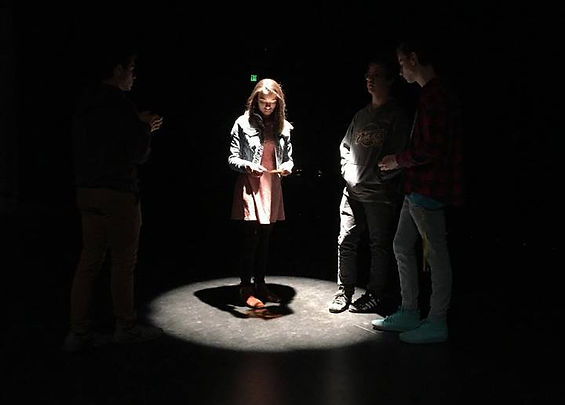Theatre
Classes
A successful theatre student is a complex individual who is better prepared to compete in a modern, creative, and collaborative educational and work environment. The Firestone Theatre experience is designed to provide hands-on learning that is directly applicable to other curricular subjects and to practical, real-world situations.

Acting and Script Analysis
Mark A. Zimmerman, instructor
This course combines understanding of the relationship between actor and script. Students research major theatre genres and influences, breaking down a script to discover objectives, obstacles, tactics and character development. They create a script with scenes, plot points and characters. They learn acting techniques, including imagery, personal associations, and inner monologue. They perform a role within an original or established piece of work.
Senior Capstone
Mark A. Zimmerman, instructor
Students apply Arts and Communication program knowledge and skills in a more comprehensive and authentic way. Capstones are project/problem-based learning opportunities that occur both in and away from school. Under supervision of the school and through partnerships, students combine classroom learning with work experience to benefit themselves and others.
Acting & Foundation Classes
Students practice the craft of acting in a safe and supportive environment. A physical style of acting is emphasized as students work on character and scene study as well as improvisation and acting styles. Students also study foundation subjects such as playwriting, film, directing, and scenic design.
Acting 1
Mark A. Zimmerman, instructor
Students explore and practice introductory techniques topics in the craft of acting. Students build vocabulary and a better understanding of the craft while undertaking a study of the physical style of acting. Student work includes improvisation, monologue study, and scene work, pantomime, physical warm-ups and exercises, vocal warm-ups and exercises, and audition skills.
Acting Performance
Mark A. Zimmerman, instructor
Meeting expectations of the casting director and audience is critical to any successful performer. This course focuses on maximizing an actor’s physical and emotional expression, vocal intonation, memorization, and imagination to convey stories and feelings. Whether spoken or sung, stylistic identity is reinforced. Other topics include material selection, developing a score of action for a role, sustaining a character, and self and peer critique.
Arts and Communication
April Post, instructor
This course is designed to give students the skills they need to successfully join the workforce in the profession of their choice. Students will plan and prepare for a future through the college and career exploration and learning the employability skills they need to be successful and become future leaders within their chosen profession. Students will explore entepreneurship opportunities for the arts and develop business plans for the artist, actor, musician, or potential business owner. Students will learn these skills through real-world projects and activities, including working with local corporate partners and will develop real materials such as resumes, websites, and online portfolios to help them with college auditions and actual empoyment.
Technical and Design Classes
Students practice a wide range of technical and design elements as they learn basic skills in carpentry, lighting, sound, costumes, props, and stage management. All students are required to develop technical and design skills and contribute to the creative process with a number of crew hours each semester.
Scenic Design
Patrick Dougherty, instructor

This course gives students the opportunity to explore their artistic and visual expression while providing practical real-world experience while learning to visualize and create the physical world of theatrical expression. Students also learn the importance of collaboration as the scene designer has to work with a production's director, lighting designer, costume designer, and technical director.
